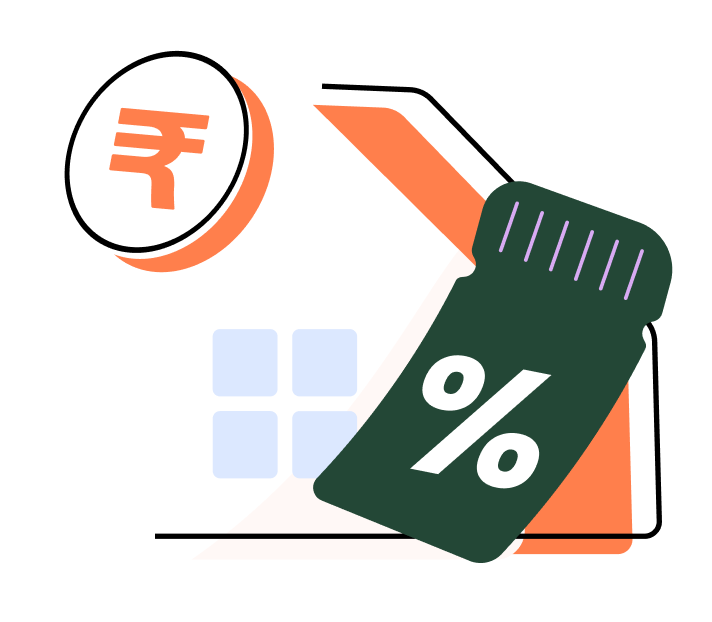
A loan against property or LAP is a secured loan provided to the borrower against their property as collateral. As the loan is secured, the interest rates are relatively low, and the loan amount is high.
Here we will discuss loans against property in detail, their features and benefits, and the application process.
LAPs work in the same manner as pawn shops, where you can put your possessions up for collateral and borrow money in return. Once you pay off the loan, your possession is returned to you.
Similarly, you can use your property as collateral to borrow funds, and it is referred to as a Loan Against Property.
How much money you’ll get and what the interest rate will be depend on the property that is being put up as collateral, along with your creditworthiness. Similar to a personal loan, there is no restriction on the end use.
However, if the borrower is unable to repay the loan, the lender may take possession of the property and auction it to recover the amount owed. Therefore, borrowers should borrow only what they need and ensure that they can repay the loan as per the terms and conditions.
The eligibility conditions imposed vary from one lender to another. However, your age, income, value of the property that is being put up as collateral, and your credit scores will matter the most.
As an example, we are mentioning the eligibility criteria for getting a loan against property through Moneyview -
The applicant must be between 21 and 70 years of age
The borrower must be either salaried or self-employed.
Additionally, you must receive the minimum salary or income as specified by your lender
Applicants must also have an acceptable credit score, preferably 750 and above.
While documents needed to avail a loan against property will vary depending on the lender, here are some of the most important ones -
The title deed of the property
Property tax paid receipts
Documents such as Occupation Certificate, etc. for the property
Insurance documents for the property
Any other documents as decided by the lender in relation to the property
Salary slips /Proof of Income
Bank account statements
Address proof
Identity Proof of the individual
Form 16/Income Tax Return
Let Your Property Fund Your Dreams
Get Attractive Loans Against Property

The application process of all loans has been simplified with the emergence of internet banking and mobile apps. The exact steps will vary based on the lender you are applying to. Here we are describing how you can apply for a mortgage loan through the Moneyview app -
1
STEP 1:
Click on 'Apply Now', fill out the application form, and submit it
2
STEP 2:
Wait for the lending partner to call you and confirm details
3
STEP 3:
The lender will coordinate with you for a site visit and an in-person discussion
4
STEP 4:
Wait for your loan to get approved and funds to be disbursed
Taking a loan against property can be a great way to get funds at low interest rates quickly. Let’s see some of the salient features and benefits of a LAP -
Since in a loan against property, the said property acts as collateral, this loan is considered to be a secured loan. These loans also come with longer repayment terms, sometimes spanning over decades, making repayment easier.
LAPs have lower interest rates than unsecured loans, such as personal loans.
Loans against property come with repayment terms that can extend up to 25 years or so, depending on the lending institution and your credit history.
If you have pledged your asset for a loan against property, then the ownership of the said property will still be in your name even while you are repaying the loan.
Depending on the type of interest rate chosen (variable or fixed), you may have the option to pre-close your loan without paying a penalty. However, this will completely depend on the lender.
Certain lenders do not add prepayment charges to the loan, which makes it a more economical option.
As loans against property are secured, they can be availed of quite easily without extensive verification processes or multiple documentation requirements. You don’t even require a high CIBIL score for it, as the lender has your property as security.
Salaried applicants can enjoy tax benefits for a loan against property under Sec 24(B) if this loan is being used to fund their new house. However, if a loan against property is used for business purposes, the borrowers can claim tax benefits under Sec 37(1) of the Income Tax Act.
There are various types of loans against property available. The exact type might depend on your bank. Here are three common types of loans against property -
If you have property that you have leased, you can take a loan on it by showing rental receipts from corporate tenants. The rate of interest starts from approximately 11%.
This is an overdraft facility given to you against your property. It works like a line of credit, where a set amount is approved for you, and you can pay interest on the amount you use.
This is a great option for senior citizens in need of funds. They can continue to live and hold ownership of their property while also getting funds using that property as collateral.
A loan against property is a great option if you need a large loan and have a property to put up as collateral. Since this loan is secured, the interest rates are relatively low, and the loan takes time to be disbursed.
Want a loan against your property without any hassle? Then, apply for a loan against property through the Moneyview app or website.No, you cannot get a loan against property without submitting proof of income.
Yes, you can get a loan against property from an NBFC or a private financier. You can also apply via the Moneyview app.
Lenders retain a margin of 20-40% of the assessed value of the property and lend for the remaining value.
For eg. If the assessed value of the property is ₹50 Lakh, and the lender decides to hold a margin of 30%, the maximum amount of loan that you can avail is ₹35 Lakh. This decision is also based on the credit profile of the borrower. If the borrower has a good credit score, the margin retained by the lender may be lower in comparison to a borrower with a low credit score.Yes, it is possible. Given below are some of the factors that have the potential to reduce your interest rate -
Borrower’s profile, such as age, location, type of employment, etc.
Credit score, wherein the higher the credit score (>750), the lower the interest rate
If the property to be mortgaged is in prime condition and in a good location
Loan repayment term, wherein the shorter the term, the higher the interest rate
Disclaimer
The starting interest rate depends on factors such as credit history, financial obligations, specific lender's criteria and Terms and conditions. Moneyview is a digital lending platform; all loans are evaluated and disbursed by our lending partners, who are registered as Non-Banking Financial Companies or Banks with the Reserve Bank of India.
This article is for informational purposes only and does not constitute financial or legal advice. Always consult with your financial advisor for specific guidance.
Was this information useful?